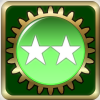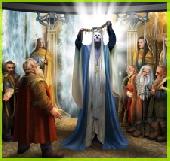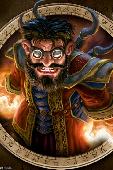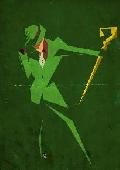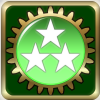-
Sat 17th Aug 2013 15:18 #1 / 28
Walter a recent graduate from William and Mary with a degree in Applied Mathematics opines on how to win at Risk by using math:
http://www.businessinsider.com/how-to-use-math-to-win-at-the-board-game-risk-2013-7
my question is, has he ever played Risk?
What do you think?
Maybe we should invite him to come here and play with us to learn how to play the game?
Then he might file a follow up story in the magazine.
Edited Sat 17th Aug 15:23 [history]
-
Sat 17th Aug 2013 16:25 #2 / 28
I can't find fault in anything written in the article...seems pretty sound to me.
-
 Sat 17th Aug 2013 16:34 #3 / 28
"I shall pass this but once, any good I can do, or kindness I can show; let me do it now. Let me not difer nor neglect it, for I shall not pass this way again." -Stephen Grellet
Sat 17th Aug 2013 16:34 #3 / 28
"I shall pass this but once, any good I can do, or kindness I can show; let me do it now. Let me not difer nor neglect it, for I shall not pass this way again." -Stephen GrelletThat article was awesome. Thanks!
It's of course only looking at the numbers. There is a very real people management element to this game, and it counts for everything.
Edited Sat 17th Aug 16:35 [history]
-
 Sat 17th Aug 2013 16:35 #4 / 28
Card Membership - putting the power of factories in your hand.
Sat 17th Aug 2013 16:35 #4 / 28
Card Membership - putting the power of factories in your hand.RECON wrote:
Maybe we should invite him to come here and play with us to learn how to play the game?
Maybe he already plays here..
Hmm.. ..on the other hand - poor guy - he'd have to append all of his work to accommodate dice mods and multiplier continents.
-
 Sat 17th Aug 2013 17:40 #5 / 28
Sat 17th Aug 2013 17:40 #5 / 28
Nice article, I like the analysis of bonus versus border territories. The one comment I have is regarding the reference to the article on Markov chains.
I reviewed the paper and I think the estimates are a bit off because it assumes you attack until you can't attack any more, which is different from the way most people attack which is until the odds no longer favor further attacking. For example, most people will not attack 1 v 1, 1 v 2, 2 v 2, or 2 v 3 unless they are desperate. But it is close enough to be very helpful.
-
 Sat 17th Aug 2013 19:21 #6 / 28
"I shall pass this but once, any good I can do, or kindness I can show; let me do it now. Let me not difer nor neglect it, for I shall not pass this way again." -Stephen Grellet
Sat 17th Aug 2013 19:21 #6 / 28
"I shall pass this but once, any good I can do, or kindness I can show; let me do it now. Let me not difer nor neglect it, for I shall not pass this way again." -Stephen GrelletI use the T alot. I use the A less so, but still quite a bit.
It's nice to read the odds on these buttons.
-
 Sat 17th Aug 2013 20:27 #7 / 28
Sat 17th Aug 2013 20:27 #7 / 28
Always T and A with you Rasty.
-
 Sat 17th Aug 2013 20:33 #8 / 28
"I shall pass this but once, any good I can do, or kindness I can show; let me do it now. Let me not difer nor neglect it, for I shall not pass this way again." -Stephen Grellet
Sat 17th Aug 2013 20:33 #8 / 28
"I shall pass this but once, any good I can do, or kindness I can show; let me do it now. Let me not difer nor neglect it, for I shall not pass this way again." -Stephen Grellet
-
 Sat 31st Aug 2013 11:53 #9 / 28
"Battles are won by slaughter and maneuver. The greater the general, the more he contributes in maneuver, the less he demands in slaughter" - Winston Churchill
Sat 31st Aug 2013 11:53 #9 / 28
"Battles are won by slaughter and maneuver. The greater the general, the more he contributes in maneuver, the less he demands in slaughter" - Winston ChurchillYou're probably right Recon. As his analysis might be correct, he handles only the tactics part of the game. I miss the strategie. Risk is all about the bigger picture, not about the optimal 'bonus army per bordering territory'.
Had fun reading the article thought.
-
 Sat 31st Aug 2013 19:28 #10 / 28
Sat 31st Aug 2013 19:28 #10 / 28
Luieuil that was exactly my point. His mathematical analysis is extremely interesting and accurate as far as it goes however I am aware that on this site the level of mathematical genius and knowledge far exceeds mine but doesn't preclude me from the opportunity to still win games.
-
 Sun 1st Sep 2013 15:41 #11 / 28
Sun 1st Sep 2013 15:41 #11 / 28
On the other hand, it is worth noting that the higher ranked players are indeed good mathematicians. Not a coincidence methinks.
-
 Sun 1st Sep 2013 17:15 #12 / 28
Sun 1st Sep 2013 17:15 #12 / 28
People often frame the debate as "math versus intuition" or "math versus experience", but in my mind it's not that simple.
It is true that through intuition/experience, an attentive person can get really good without math. Also, by focusing on math that isn't critical to the game, a math person can gain almost no skill after having put in a lot of effort on the math side. But, a math person can focus on the right math and bypass the usual effort required to gain intuition or experience.
That article focused on some interesting stuff, but not the useful skills. The most useful mathematical tool is figuring out how likely an elimination is and what the board will probably look like after. A lot of games end in a series of card-capturing eliminations. My strategy centers around positioning myself for this. Stay alive. Make large armies. Use Australia not for expansion, but for making large armies to kill people. Is this elimination a bad idea? Should I wait a turn? Should I bait an opponent to make an unwise elimination of another player? The math helps to answer these questions.
So, maybe the author wouldn't do well on our Risk map, the one we call Wargear Warfare. And maybe some non-math people are doing quite well. But, there are people on this site who got good through doing the right kind of math.
Edited Sun 1st Sep 17:17 [history]
-
 Sun 1st Sep 2013 21:33 #13 / 28
Card Membership - putting the power of factories in your hand.
Sun 1st Sep 2013 21:33 #13 / 28
Card Membership - putting the power of factories in your hand.I agree with Hugh. Yes, there's a math component - and the intuition/experience part of it is basically a math course, only with guess-and-check lessons that results in a muscle-memory kind of mathematical understanding of how to best play the game. In this sense, the "mathematician's" advantage is over-rated, but as Hugh also suggests, there's even more to it that that.
I don't consider myself to be among the top echelon players here, but I'm pretty sure that a pure math-headed approach to this game wouldn't hold up well at all in a typical multi-player game on this site against decent players.
Better players look at the implications of a position through the eyes of their opponents and consider questions like - "Do I look too weak ..or too strong?" They also consider things like the individual strengths and corresponding expected tendencies of their opponents. Even in the absence of alliances, there is the reality of implied alliances, involving things like the subtle placement of 'not too threatening" units on "cold-war" borders.
Bottom line - there's dice - so yeah, there's math - but that's only a part of the big picture. I'll bet there are more than a few top players on this site that are strictly muscle-memory WarGear mathematicians.
-
 Sun 1st Sep 2013 22:12 #14 / 28
"I shall pass this but once, any good I can do, or kindness I can show; let me do it now. Let me not difer nor neglect it, for I shall not pass this way again." -Stephen Grellet
Sun 1st Sep 2013 22:12 #14 / 28
"I shall pass this but once, any good I can do, or kindness I can show; let me do it now. Let me not difer nor neglect it, for I shall not pass this way again." -Stephen GrelletSome math really helps:
I have a better chance of keeping more units if I attack 25 attackers to 25 defenders than 3 attacker to 3 defenders
I have significantly greater odds if I have just one more number on the attacker die, and not-that-much lower odds if I have an extra number on the defender die.
I'm not gonna make it if I have 10 units in a stack and I want to conqur 6 territories.
But then again, sometimes the not-math approach is helpful too: I look really strong (even if I'm not) and everyone is going to attack me!
A good player leverages everything I should think.
-
 Sun 1st Sep 2013 23:28 #15 / 28
Sun 1st Sep 2013 23:28 #15 / 28
I also don't like the author's conclusion about attacker edge: that you should pre-emptively strike when a border is destined for dispute. This is fine on some maps, but the Risk map is so small that you shouldn't think of a situation as being between just 2 players, unless it the game really is down to 2 players.
The attacker's edge is not enough to justify bringing both you and one other person down while all other players enjoy the benefits of the clash. Because of this, borders often go undisputed, which makes the pre-emptive strike unnecessary. If it's against a weak opponent who always plays World Police, it's probably best not to invite the attack in the first place.
In summary, it's easy to do some correct math and arrive at bad conclusions. However, good conclusions can come from math if you're careful :)
Edited Sun 1st Sep 23:36 [history]
-
 Mon 2nd Sep 2013 14:26 #16 / 28
Mon 2nd Sep 2013 14:26 #16 / 28
It's implicit that other factors are involved. The article just takes on the logical and logistical elements. Would anyone want to really read a 324 page discertation on risk?
-
 Mon 2nd Sep 2013 14:28 #17 / 28
Mon 2nd Sep 2013 14:28 #17 / 28
On the other hand, I am still amazed when I run across players who resent being PM'd. Clearly, these types want only to focus on the mathematical element and cannot be bothered with communication, even if it's to their profit.
-
 Mon 2nd Sep 2013 14:41 #18 / 28
Mon 2nd Sep 2013 14:41 #18 / 28
I agree that math is only part of being a good strategist, but an important one in my opinion. As Hugh mentioned, it is very helpful when considering elimination. For example, you can estimate your odds at eliminating an opponents/opponents and then use that as input to your decision.
If I estimate a 90% chance of elimination, I will almost always act. However, if I estimate only 70%, I will act, or not, based on the current situation - perhaps my opponents have a sustainable advantage that I cannot overcome and I am becoming desperate.
Even though the math does not determine an action, it is crtical data needed for making that decision when considered with the other 'non-math' data.
-
 Mon 2nd Sep 2013 15:16 #19 / 28
Mon 2nd Sep 2013 15:16 #19 / 28
Thingol wrote: It's implicit that other factors are involved. The article just takes on the logical and logistical elements. Would anyone want to really read a 324 page discertation on risk?
Yeah, I may not have granted him the proper slack for using the hypothetical on the border attacks. Regardless, the article is titled, "How to Use Math To Crush Your Friends At 'Risk' Like You've Never Done Before," so it only seems right to go after him! (Yes yes, the title is to sell magazines, I know.)
There are fewer words in this thread than his article, and SquintGnome's post captures the essence of what math is useful for in Risk very nicely. We add a few charts and graphs to his post, and we've got ourselves a more substantive article with as many words.
-
 Mon 2nd Sep 2013 17:03 #20 / 28
"Battles are won by slaughter and maneuver. The greater the general, the more he contributes in maneuver, the less he demands in slaughter" - Winston Churchill
Mon 2nd Sep 2013 17:03 #20 / 28
"Battles are won by slaughter and maneuver. The greater the general, the more he contributes in maneuver, the less he demands in slaughter" - Winston ChurchillSquintGnome wrote:
I agree that math is only part of being a good strategist, but an important one in my opinion. As Hugh mentioned, it is very helpful when considering elimination. For example, you can estimate your odds at eliminating an opponents/opponents and then use that as input to your decision.
If I estimate a 90% chance of elimination, I will almost always act. However, if I estimate only 70%, I will act, or not, based on the current situation - perhaps my opponents have a sustainable advantage that I cannot overcome and I am becoming desperate.
Even though the math does not determine an action, it is crtical data needed for making that decision when considered with the other 'non-math' data.
+1
Making estimates as accurate as possible is gonna help you alot in decisionmaking. Good math can prevent you from making mistakes as well. It's a usefull tool among others to make the best possible decision each turn.
I do think most good players have their math straight, but a good common sense can take you very far as well.



